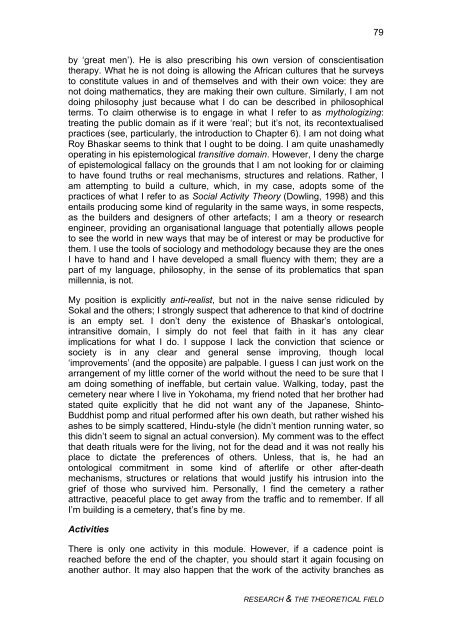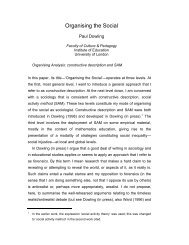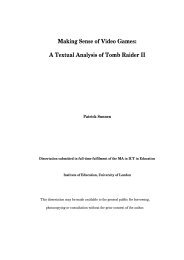Research and the Theoretical Field - Pauldowling.me
Research and the Theoretical Field - Pauldowling.me
Research and the Theoretical Field - Pauldowling.me
Create successful ePaper yourself
Turn your PDF publications into a flip-book with our unique Google optimized e-Paper software.
79<br />
by ‘great <strong>me</strong>n’). He is also prescribing his own version of conscientisation<br />
<strong>the</strong>rapy. What he is not doing is allowing <strong>the</strong> African cultures that he surveys<br />
to constitute values in <strong>and</strong> of <strong>the</strong>mselves <strong>and</strong> with <strong>the</strong>ir own voice: <strong>the</strong>y are<br />
not doing ma<strong>the</strong>matics, <strong>the</strong>y are making <strong>the</strong>ir own culture. Similarly, I am not<br />
doing philosophy just because what I do can be described in philosophical<br />
terms. To claim o<strong>the</strong>rwise is to engage in what I refer to as mythologizing:<br />
treating <strong>the</strong> public domain as if it were ‘real’; but it’s not, its recontextualised<br />
practices (see, particularly, <strong>the</strong> introduction to Chapter 6). I am not doing what<br />
Roy Bhaskar seems to think that I ought to be doing. I am quite unasha<strong>me</strong>dly<br />
operating in his epistemological transitive domain. However, I deny <strong>the</strong> charge<br />
of epistemological fallacy on <strong>the</strong> grounds that I am not looking for or claiming<br />
to have found truths or real <strong>me</strong>chanisms, structures <strong>and</strong> relations. Ra<strong>the</strong>r, I<br />
am attempting to build a culture, which, in my case, adopts so<strong>me</strong> of <strong>the</strong><br />
practices of what I refer to as Social Activity Theory (Dowling, 1998) <strong>and</strong> this<br />
entails producing so<strong>me</strong> kind of regularity in <strong>the</strong> sa<strong>me</strong> ways, in so<strong>me</strong> respects,<br />
as <strong>the</strong> builders <strong>and</strong> designers of o<strong>the</strong>r artefacts; I am a <strong>the</strong>ory or research<br />
engineer, providing an organisational language that potentially allows people<br />
to see <strong>the</strong> world in new ways that may be of interest or may be productive for<br />
<strong>the</strong>m. I use <strong>the</strong> tools of sociology <strong>and</strong> <strong>me</strong>thodology because <strong>the</strong>y are <strong>the</strong> ones<br />
I have to h<strong>and</strong> <strong>and</strong> I have developed a small fluency with <strong>the</strong>m; <strong>the</strong>y are a<br />
part of my language, philosophy, in <strong>the</strong> sense of its problematics that span<br />
millennia, is not.<br />
My position is explicitly anti-realist, but not in <strong>the</strong> naive sense ridiculed by<br />
Sokal <strong>and</strong> <strong>the</strong> o<strong>the</strong>rs; I strongly suspect that adherence to that kind of doctrine<br />
is an empty set. I don’t deny <strong>the</strong> existence of Bhaskar’s ontological,<br />
intransitive domain, I simply do not feel that faith in it has any clear<br />
implications for what I do. I suppose I lack <strong>the</strong> conviction that science or<br />
society is in any clear <strong>and</strong> general sense improving, though local<br />
‘improve<strong>me</strong>nts’ (<strong>and</strong> <strong>the</strong> opposite) are palpable. I guess I can just work on <strong>the</strong><br />
arrange<strong>me</strong>nt of my little corner of <strong>the</strong> world without <strong>the</strong> need to be sure that I<br />
am doing so<strong>me</strong>thing of ineffable, but certain value. Walking, today, past <strong>the</strong><br />
ce<strong>me</strong>tery near where I live in Yokohama, my friend noted that her bro<strong>the</strong>r had<br />
stated quite explicitly that he did not want any of <strong>the</strong> Japanese, Shinto-<br />
Buddhist pomp <strong>and</strong> ritual perfor<strong>me</strong>d after his own death, but ra<strong>the</strong>r wished his<br />
ashes to be simply scattered, Hindu-style (he didn’t <strong>me</strong>ntion running water, so<br />
this didn’t seem to signal an actual conversion). My com<strong>me</strong>nt was to <strong>the</strong> effect<br />
that death rituals were for <strong>the</strong> living, not for <strong>the</strong> dead <strong>and</strong> it was not really his<br />
place to dictate <strong>the</strong> preferences of o<strong>the</strong>rs. Unless, that is, he had an<br />
ontological commit<strong>me</strong>nt in so<strong>me</strong> kind of afterlife or o<strong>the</strong>r after-death<br />
<strong>me</strong>chanisms, structures or relations that would justify his intrusion into <strong>the</strong><br />
grief of those who survived him. Personally, I find <strong>the</strong> ce<strong>me</strong>tery a ra<strong>the</strong>r<br />
attractive, peaceful place to get away from <strong>the</strong> traffic <strong>and</strong> to re<strong>me</strong>mber. If all<br />
I’m building is a ce<strong>me</strong>tery, that’s fine by <strong>me</strong>.<br />
Activities<br />
There is only one activity in this module. However, if a cadence point is<br />
reached before <strong>the</strong> end of <strong>the</strong> chapter, you should start it again focusing on<br />
ano<strong>the</strong>r author. It may also happen that <strong>the</strong> work of <strong>the</strong> activity branches as<br />
RESEARCH & THE THEORETICAL FIELD




